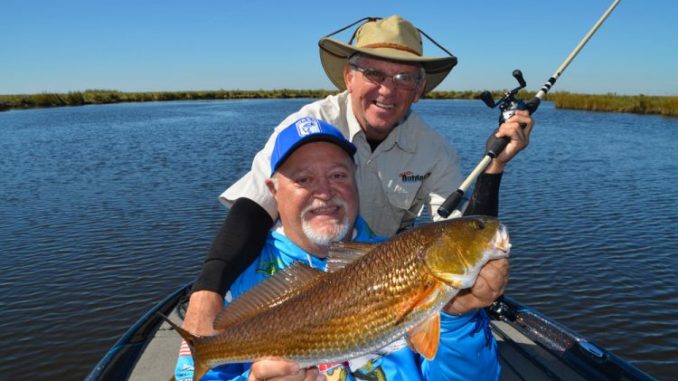
While Delacroix fishing is fabulous, it takes some skill and know-how to consistently connect on a trifecta. Gene Hoover and Chef KD Diez give some tips to help anglers make successful trips:
1) The peak time to score a trifecta is from the end of September to the end of December, peaking in late October and early November.
2) If you don’t know Delacroix, buy a Standard Map Company map before the trip.
3) Best of all, use a guide for your first trip — and still buy a map.
4) Live shrimp will help assure a successful trip. Generally, live bait will catch twice as many speckled trout as will artificial lures.
5) Pick your days. Right before a cold front is best. Right after a front is worst. Allow two or three days after a front before going.
6) If you want to talk to Capt. Jack Payne, owner of Sweetwater Marina, get there early. His information on where fish are biting is accurate because he captains a charter boat most days. But be aware that he will be busy most mornings.
7) If the fish are hitting plastics but not taking it, fish deeper or change colors.
8) If water temperatures are below 60º F in the morning, fish spots like the outside bends of natural bayous and Oak River until the sun warms the water.
9) Bring the marina’s phone number in case you get stuck when the tide is low. It is easy to get bottomed out, even in the middle of some major bays or pipeline canals. If the water is low, don’t go anywhere you don’t know on low tide. Do your exploring on high tide.
10) Bring a push pole.
11) Keep your lure selection simple — a couple of your favorite colors of plastic for use under a popping cork or on a safety pin spinner. On overcast days, colors like June bug are good for bass baits. On bright days, watermelon red 6-inch worms on small hooks with small weights are a good choice.
Finesse fishing for bass with a lot of colors isn’t needed at Delacroix. Bass have to compete with specks, reds, drum and other fish and are not picky. A bone-colored topwater lure is good to have, too.
12) Stay away from duck blinds and duck ponds during duck season. You often can’t fish the same places you did before the season, unless you don’t go out until after 10 a.m.
13) Start your mornings with trout or bass because redfish are less finicky about the time of day they bite.
14) All three species are found in the marsh, but may relate to different parts of it. Trout like open water. Bass like cuts and drains, while redfish like shorelines.